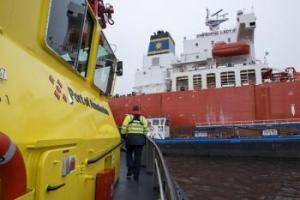Harbour Master
Harbour Masters
Worldwide there are approximately 3,000 merchant ports and the work of the Harbour Master can vary widely from country to country and from port to port even within the same country.

IHMA is pleased to announce that Alex Mc Intosh, Marine Manager, Aberdeen Harbour Board, will represent the Association at the Women in Shipping Summit, 10-11 September 2019, London. Furthermore, there is a 20% discount available for IHMA members attending the Summit.
The following information is provided by the conference organiser:
Thursday 27 - Friday 28 June 2019
How and with who will the ship of the future communicate?
This is the question that industry, ship owners and managers, ports, nautical service providers, university and research projects will seek to answer in this biennial EHMC seminar. The day will include live demonstrations of industry products and a visit by boat within the Port of Gothenburg that will also take us around the harbour area.
Speakers;
"Port Choice"
The 2017 seminar was a first in the history of our Committee, as it was held in the Moroccan port of Tanger Med. This was a consequence of the previous seminar in 2015, which was held in Marseille and where we reached out to our North African colleagues who are Harbour Masters, Port Captains and their deputies.
Tanger Med has built a leading hub port on the south shore of the Strait of Gibraltar. Beginning service in July 2007, the Tanger Med port is now operating amongst the world's leading ports.
On the occasion of the 2015 seminar in Marseille, we reached out to our North African colleagues who are Harbour Masters, Port Captains and their deputies.
Le séminaire biennale de l’ EHMC est un événement sur deux jours qui permet aux Commandants des port Européens de se rencontrer pour se connaitre et échanger sur des sujets d'intérêt commun.
"Adapting to changes; ships using LNG as fuel, reporting through a Single Window"
Andreas Mai has hosted a triple E-event in which one day knew the EHMC seminar, a second day was dedicated to the Green Efforts project and a third day to an ESPO MAS meeting. The EHMC Seminar was about;
"The Safe Port; information and education"
Program;
When and how can Harbour Masters consult the SafeSeaNet system?
UK Certificate of Competency for Harbour Masters
Bachelor and Master degree for ex-seafarers aiming at a higher university degree
EHMC and the ESPO Maritime Affairs & Security Committee
European Nautical Platform
EHMC film on Safe Mooring “the Missing Link, improving the mooring process"
"Extreme Weather Decisions"
Program;
Practical experience of Ports on the West Coast of Ireland resulting from the increasing number of violent winter storms Introduction
EHMC video project, dealing with all issues related to the ship-shore interface
EBA: “Mooring instructions in extreme weather conditions”
CESMA; “Who in the end is responsible for admission decision when entering a port with storms of over force 8”
"Beyond ISPS; further enhancing port security"
Program;
The Danish approach to security
Maritime and port security in the EU: any need for a single and simpler legal instrument?
VTMIS – How a vertical VTMIS can enhance security in the port
New Developments in Maritime Safety and Harbour Security Systems
A day in the life of a Harbourmaster enforcing the ISPS code and Port Directive
Information sources related to compliancy of port facilities
"Safe Seas, Safe Ports"
Program;
Safe seas;
the different roles of the Harbour Master
The regulatory side of Safe Sea Net
Preventive and safety related information management
The progress of Safe Sea Net
Safe ports;
Acceptance in ports of ships in distress
Breakdown and blackouts
Developments in ship design and construction
"How do we handle ship waste in Europe? Implications of
regulations and practices"
Founded in 2017, MarineLabs delivers high-resolution, real-time, and historical wind, wave, and weather data, as well as hyper-local 10-day forecasting, from a growing network of cloud-connected, rugged sensor nodes.
The International Harbour Masters Association (IHMA) and the Port of Rotterdam Authority are pleased to announce the 15th International Harbour Masters Association Congress, to be held from 09–12 June 2026 at Theater Zuidplein in Rotterdam.
Join the world’s premier professional body for harbour masters and receive up-to-date information on the industry and access to the members' area of the website.